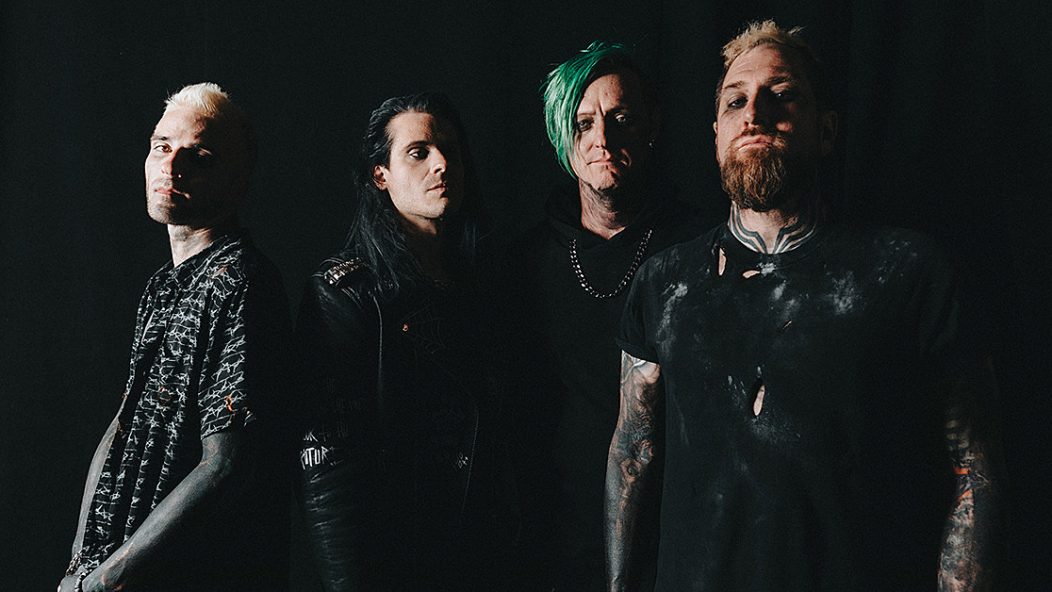
DED's School Of Thought is changing the face of metal for the better
The new face of metal is changing for the better. Gone are the days where divisive, controversial personalities of individual musicians and their fraught relationships with their fellow artists dominate and drown out the music. In a world where the music matters now more than anything, grabbing headlines is the last way to get ahead in today’s industry, where audiences favor a more wholesome approach of homegrown artists who live for the songs they create and the emotions they inspire.
Making their mark on the evolving scene are Tempe, Arizona’s genre-defining outfit DED, forged from the collective ashes of From First To Last, Greeley Estates, and Man Made Machine, who are bringing their sharp tongues and cutting takes on the state of the world to their lyrics rather than the headlines. Founding member and vocalist Joe Cotela is a model of this new musical generation. He’s set up home in the verdant woodlands of New York, where the band have resorted to shooting music videos amid the pandemic, taking his years of experience in previous bands to shape a lasting legacy for his passion project DED.
Read more: The Used’s self-titled debut at 20: an oral history
Established six years ago purely as a means of paying homage to their metal forefathers Korn, Slipknot and Pantera, the buzz surrounding the fledgling venture soon grew way beyond the members’ expectations. Before they knew it, DED were caught up in a whirlwind of intense touring, mounting public attention and the opportunity to record their debut album with legendary producer John Feldmann.
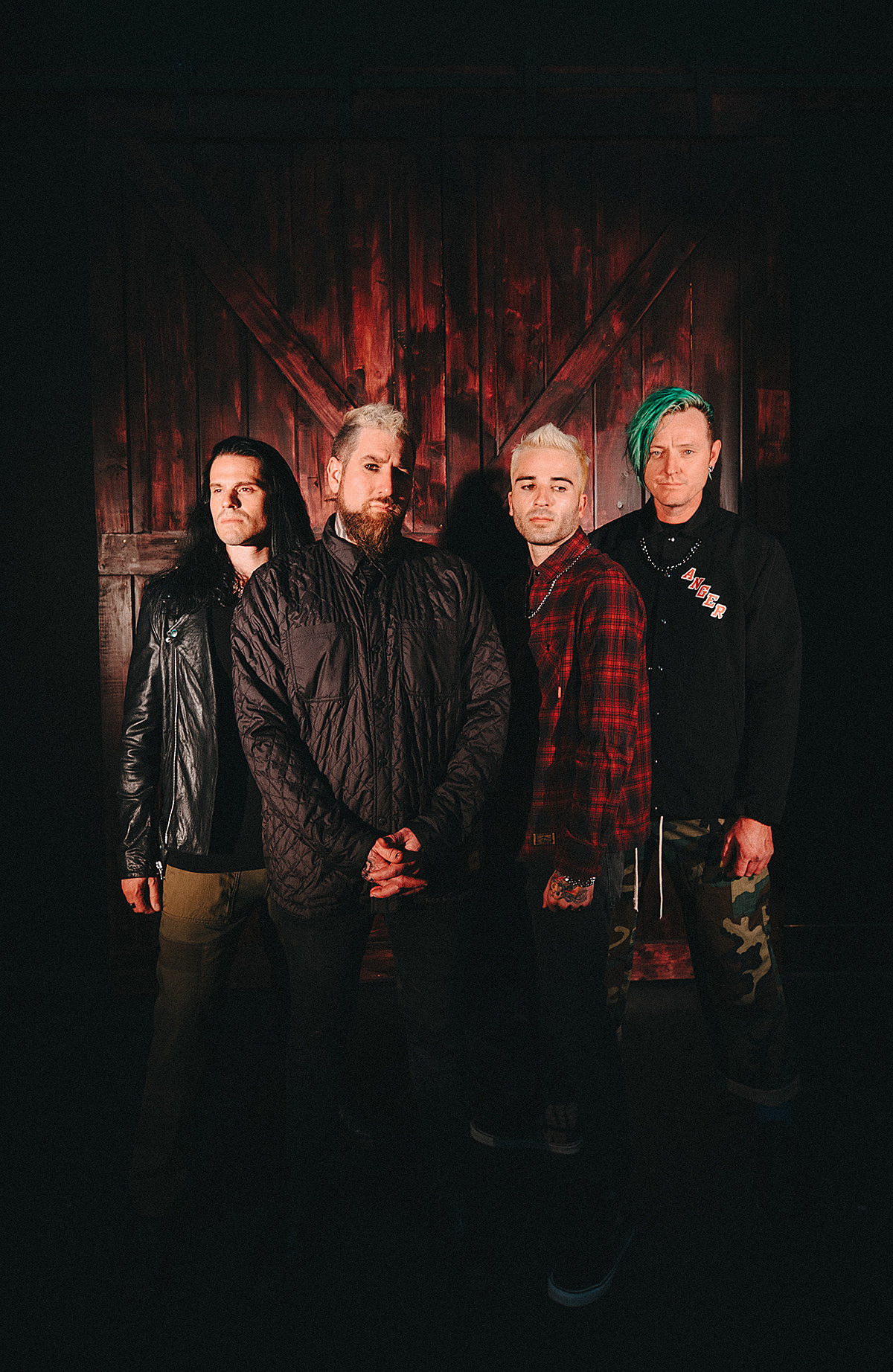 [Photo by Jordan Kelsey Knight]
[Photo by Jordan Kelsey Knight]
That fateful opportunity resulted in the four-piece’s storming debut effort, Mis•an•thrope. It detailed a disillusion with humankind and its failures through classic nü-metal melodies and industrial-inspired grinding riffs. That was accompanied by a slick, dark image, including white contact lenses and a thoroughly on-brand “dead” aesthetic. Where later additions to the nü-metal history books tarred the genre with self-important, shallow, morally diluted lyrics and music made purely for income and popularity, DED make a defiant return to the reasons nü metal came to fruition in the first place—giving the misfits of metal a safe space to speak up and thrive.
However, much like the iconic metal bands that blazed the trail before them, each album brings with it a new blueprint, a departure from the past template to establish a new world order. Taking their time to allow the outfit’s next era to grow in its own space, DED return in 2021 after a whopping four years and a plethora of tours (Korn, Blessthefall) with a voracious new record, School of Thought. It’s crammed to the rafters with tracks to once again make listeners think twice about their lives and the effect their actions make on the world around them, arriving just in time for post-pandemic reflections on the hard lessons of the last year-and-a-half.
Read more: Inside the next wave of British heavy metal
Their present-day sound draws in a wider range of inspirations, paying tribute to their peers alongside flexing their own instrumental prowess garnered from their cumulative years in the music industry. Their now-trademark dark aesthetic delves into the grungier side of the spectrum, ditching their unifying white contacts in favor of blackened accents and a live presence worthy of their nü-metal predecessors.
As DED prepare to usher in the new generation, promising a roller coaster of emotions on their forthcoming studio output, frontman Cotela gave Alternative Press the lowdown on their new guise, where DED stand in metal history, the effects of the pandemic on touring and what’s next for a band that are, perhaps at times unconsciously, changing the landscape of metal for good.
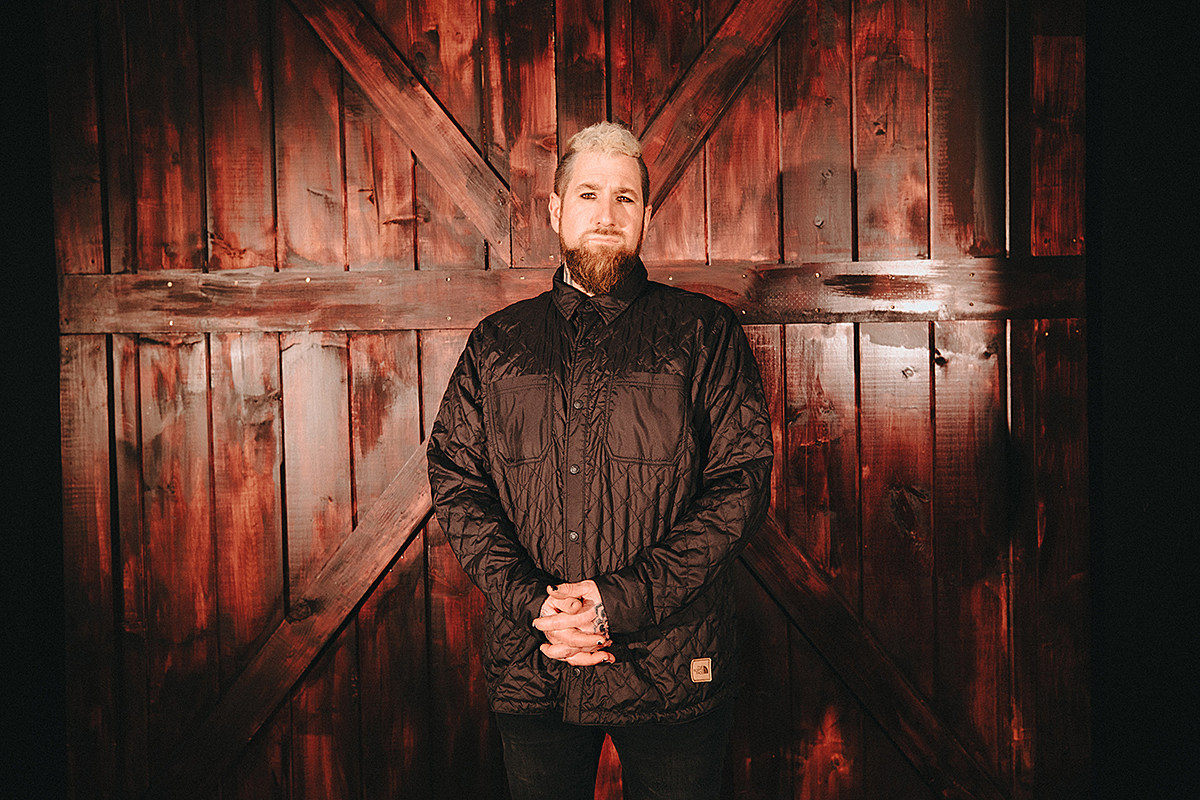 [Photo by Jordan Kelsey Knight]
[Photo by Jordan Kelsey Knight]
DED have taken the nü-metal world by storm over the last few years with the expertise and musical maturity of a band twice your age. Take us all the way back to the beginning. Where did you first meet, and how did DED gain so much traction so quickly?
Joe Cotela: It started with the original guitar player David Ludlow, who was in the band Greeley Estates, and Matt Good of From First To Last. About six years ago, the three of us were having coffee and talking about how awesome Slipknot, Pantera and Korn are, so we thought, “Let’s just go and make some music at Matt’s apartment.” We started that and [were] just having fun. There was no intention of doing anything beyond that. We ended up having so much fun with it that we made an EP and planned on just playing dive bars in Arizona.
At the time, I was over the music industry. I didn’t want to really worry about playing music anymore, as far as making a career out of it goes. We made that EP and naturally sent it out to people. We started playing some cool local shows, opening for Upon A Burning Body and The Acacia Strain, so a little buzz started happening. The EP got to a bunch of people, and we started getting phone calls about it, so we realized, “All right, looks like we’re gonna do something with this.” At this point, Matt Good stepped away because he only wanted to do this for fun, and he wanted to focus on his production work.
Eventually, Goldfinger’s John Feldmann got it. He took us out to California, and it was like a dream. My first show was at a festival with Goldfinger, so this was such a serendipitous thing for me. We had an awesome time out there with John, sitting around his kitchen eating vegan tacos, and ended up recording a song together, then an entire album. John’s done so many great albums that we love, so it went great. John had people come in for us. We’d do showcases for labels, and we ended up getting linked up with Benji, Joel and Josh Madden, who managed us for about a year, which was amazing. We ended up getting with Jordan Schur, who’s now our manager on our label Suretone Records. Jordan’s a legend. He’s managed Limp Bizkit and a million other things. From there, it’s been full throttle—everything seems like a big blur of awesomeness and touring. It’s definitely the beginning of something.
The new generation of rock and metal stars are a lot less egotistical and more wholesome. You’re bringing back the concept that musicians are worth looking up to. Which bands inspired your approach to your music career and the distancing from self-centered stars?
I got my first guitar because of Nirvana. My first band was a punk band into things like Alkaline Trio and Slapstick, MxPx. That was the beginning of things. I really come from that punk-rock world, which is definitely not about the grandiose stuff. There’s an ethos that comes with that, a punk-rock and hardcore mentality of just wanting to make music, and if people like it, people like it. We don’t stand for the misogyny of the past. That was a different time. We’re definitely more about the music and being humble, legit people; our music is angry, but underneath all of it, there’s a huge positive message about trying to help people think about who they are, what they stand for, what they consume, taking a look at the world around us and what humanity is. Our first album was called Mis•an•thrope because it was about my disappointment with the human race, so that’s a theme I’ll always have, and we also carried that into our new album as well.
We share the themes of self-empowerment from punk rock, hardcore and metal, even though a lot of people have us pegged as nü-metalcore because we definitely draw from that genre’s sounds like Limp Bizkit, Deftones and System Of A Down. Those bands were all legit, but after the more watered-down second wave of nü metal, that genre gets pegged with slightly dumbed-down lyrics when people look at them from the surface. That wave was doing a shallow version of things, whereas we definitely try to have more conscious lyrics about being the best version of yourself. I remember I loved all those iconic bands at the time and the whole movement that was happening around it. Then I fell off it around the same time as that second wave. I jumped ship when I found Glassjaw and Every Time I Die.
Nü metal always has such a huge place in my heart. We’ve had the amazing opportunity to tour with Korn a couple of times, and they’re the best people ever. They’re the godfathers of that vibe, even though a lot of them don’t want to be associated with [the genre] anymore because they started it. They aren’t happy with what came after them, and I respect that.
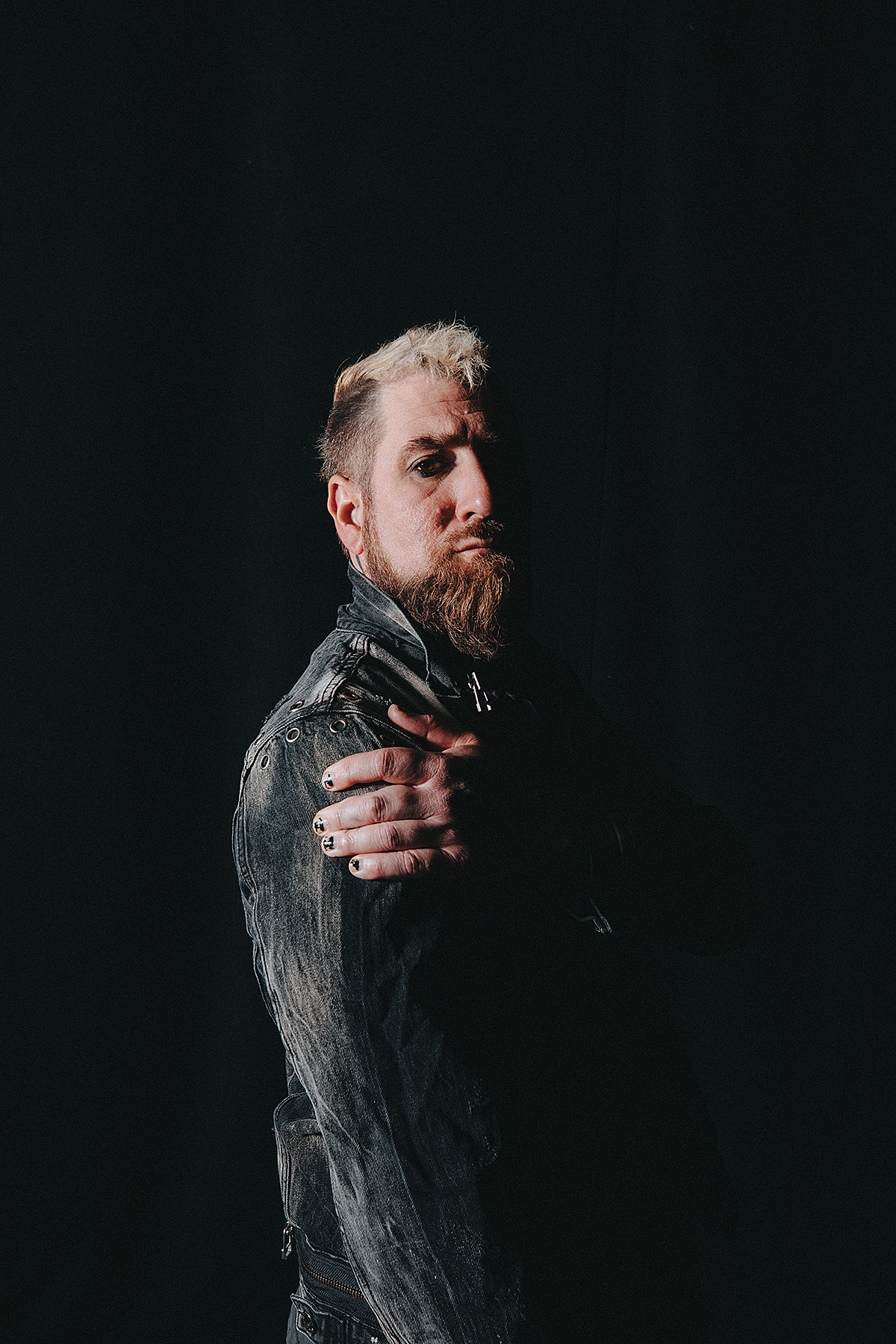 [Photo by Jordan Kelsey Knight]
[Photo by Jordan Kelsey Knight]
DED are all about the bleak aesthetics—you all wore white contact lenses throughout your last album cycle. What new image features can we expect to see through this next era?
We did contacts for a while. We had black straitjackets when we first started and moved into street clothes with white contacts. This time around, I want to go through different phases for us. I don’t wanna be locked in a box where we have to do the same thing forever. In between Mis•an•thrope and now, which is such a weird time for us, we’ve toured a bit, and I was doing almost like a Viking thing with my image.
I love having different eras. When I look at David Bowie, Metallica [and] Lady Gaga, they’ve always adapted, changed, and made it exciting, and that’s what we wanna do too. We want to go with whatever feels right in the moment because you grow every year. You’re never the same person as you were five years ago, which is true for us. Unless you find something timeless and incredible so that becomes your thing. For us right now, it’s an ever-evolving image, and we’re having fun with it.
Coming from the punk world, I used to be anti-dressing up, and that wasn’t cool for me at all. I hated it, actually. But once I started doing it, I grew up and realized I was having fun with it. We had fans starting to wear our white contacts, and it was a really cool thing after being so against it for years. I’ve embraced it a lot and done a lot of research into it, looking into Alice Cooper and White Zombie and all the bands that started it. When you get into that character, there’s something that happens to you, and you really feel empowered by it.
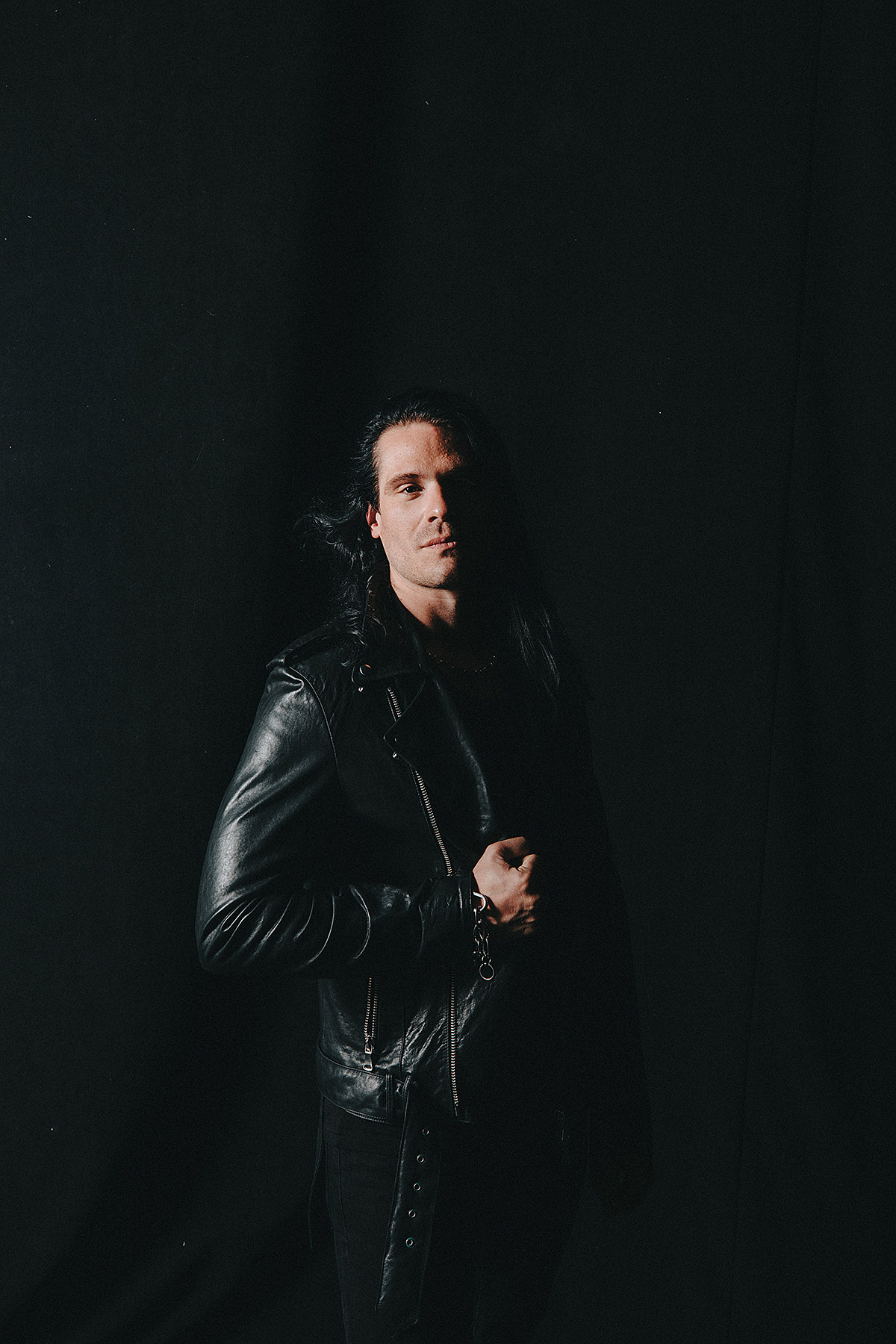 [Photo by Jordan Kelsey Knight]
[Photo by Jordan Kelsey Knight]
It’s been a massive four years since your last full-length, Mis•an•thrope, in 2017. Four years is a lifetime in this industry, and fans have been begging you for a new album ever since. How long has this new effort been in the works?
When we first started touring, we were so busy, and we’d never done that amount of touring before, so it was a whirlwind. The first album and the band got received so well. It exceeded our expectations, so we were caught up in it and just kept going and going. We toured nonstop, but eventually, we went, “OK, we’ve got to do another album.” We got in with producer Kevin Churko for this second album, who is a legend. He’s done Ozzy Osbourne records, In This Moment, Five Finger Death Punch, a bunch of really cool stuff. We were still touring in between recording sessions, and Kevin was recording big bands in between our sessions, too.
John Feldmann did the same thing when we were out with him. He was doing Black Veil Brides and blink-182 simultaneously, so we actually used Travis Barker’s drum kit for our first album. Mark [Hoppus] was the first one to release a DED song on his podcast, so we have huge love for the blink guys.
We made this second album with Kevin out in Las Vegas over three or four months back and forth between touring, and it was incredible. After being in music for a while, you go through different phases as artists. You experience that frustration and self-doubt through time. I had an older band where we were writing songs and sending them in, and it felt like we were losing the soul of things, which is why DED is so awesome. Because we did it strictly for fun with no intentions, and then it ended up being the most successful, well-received thing I’ve ever worked on.
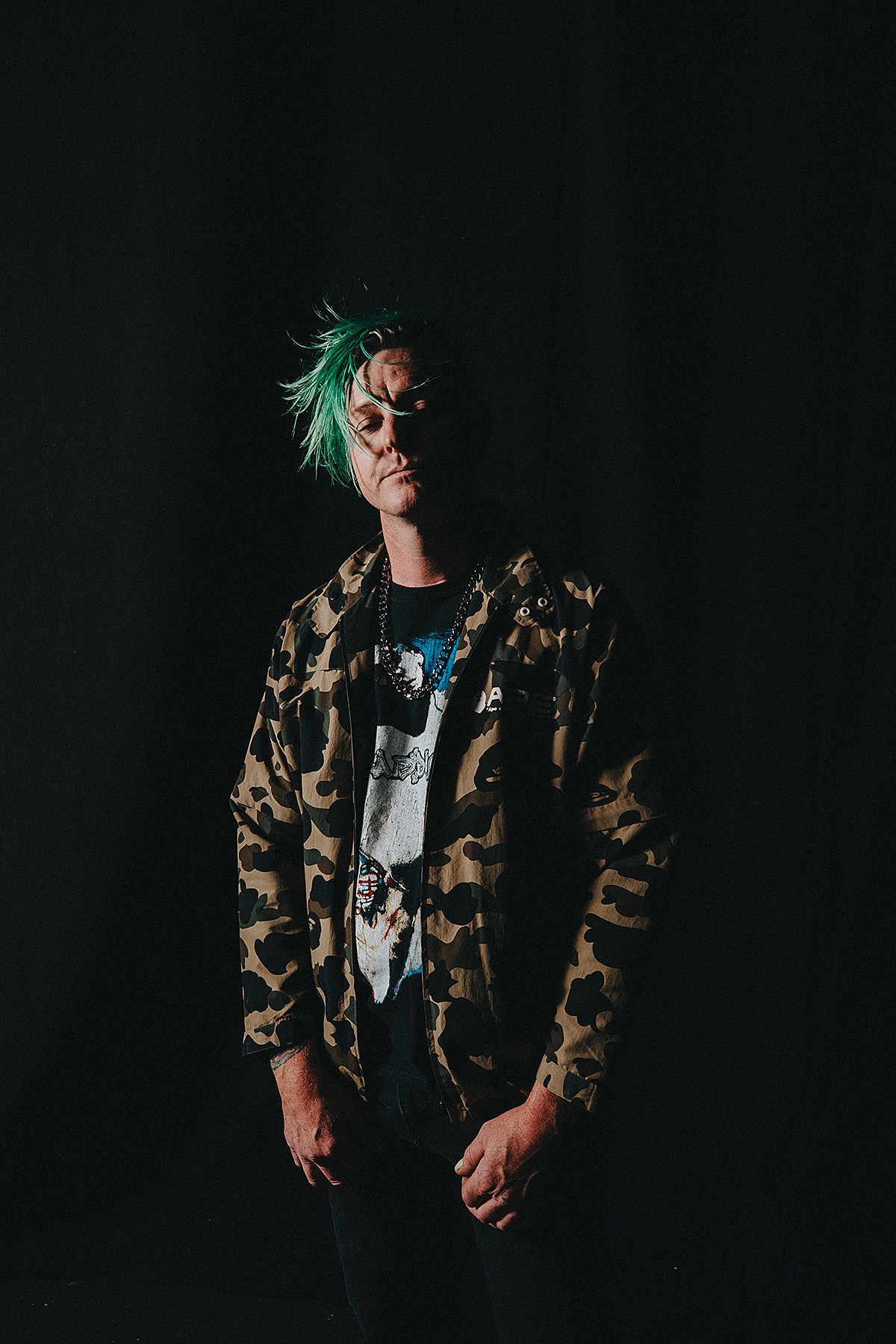 [Photo by Jordan Kelsey Knight]
[Photo by Jordan Kelsey Knight]
What’s the name of your new album, and how does that correlate to the music we’re about to hear on the record?
The new album is called School Of Thought. Most of my lyrics are conscious lyrics—maybe at face value if you hear the chorus, then you maybe wouldn’t know that—but it all depends on how you listen to it. This album is all about thinking about what you do, being cognitive, being conscious and being aware of what you consume and what you support.
That angle comes from me because I’ve had some really tough bouts of anxiety over the last 10 years. I’ve gone to cognitive therapy and a lot of different things, and it’s made me take a step back. It’s changed my whole viewpoint on things. It makes me want to tell people to take control of their brains, their thought process, their bodies and be healthy, everything that changed my life because I was really struggling with anxiety and bouts of depression. I don’t use depression lightly. That’s not a word I like to throw around, and it’s thrown around a lot more than it should be, but I definitely had feelings of that as well throughout time. I was also drinking a lot and eating poorly, all those things. I’ve done a lot of research on how to be healthy without medicines and shit like that because medicines are just a little Band-Aid you stick on it, and the drug companies keep giving it to you—they don’t want to fix you.
All the lyrics are about taking a step back, thinking about yourself, thinking about what we take as everyday stuff. The term “school of thought” is about a group of people that think a certain way and have a certain ethos, so I really wanted that to be a part of everything—for people to listen to the music to dig deep into the lyrics and to understand that even though it’s negative-sounding, it’s all positive underneath.
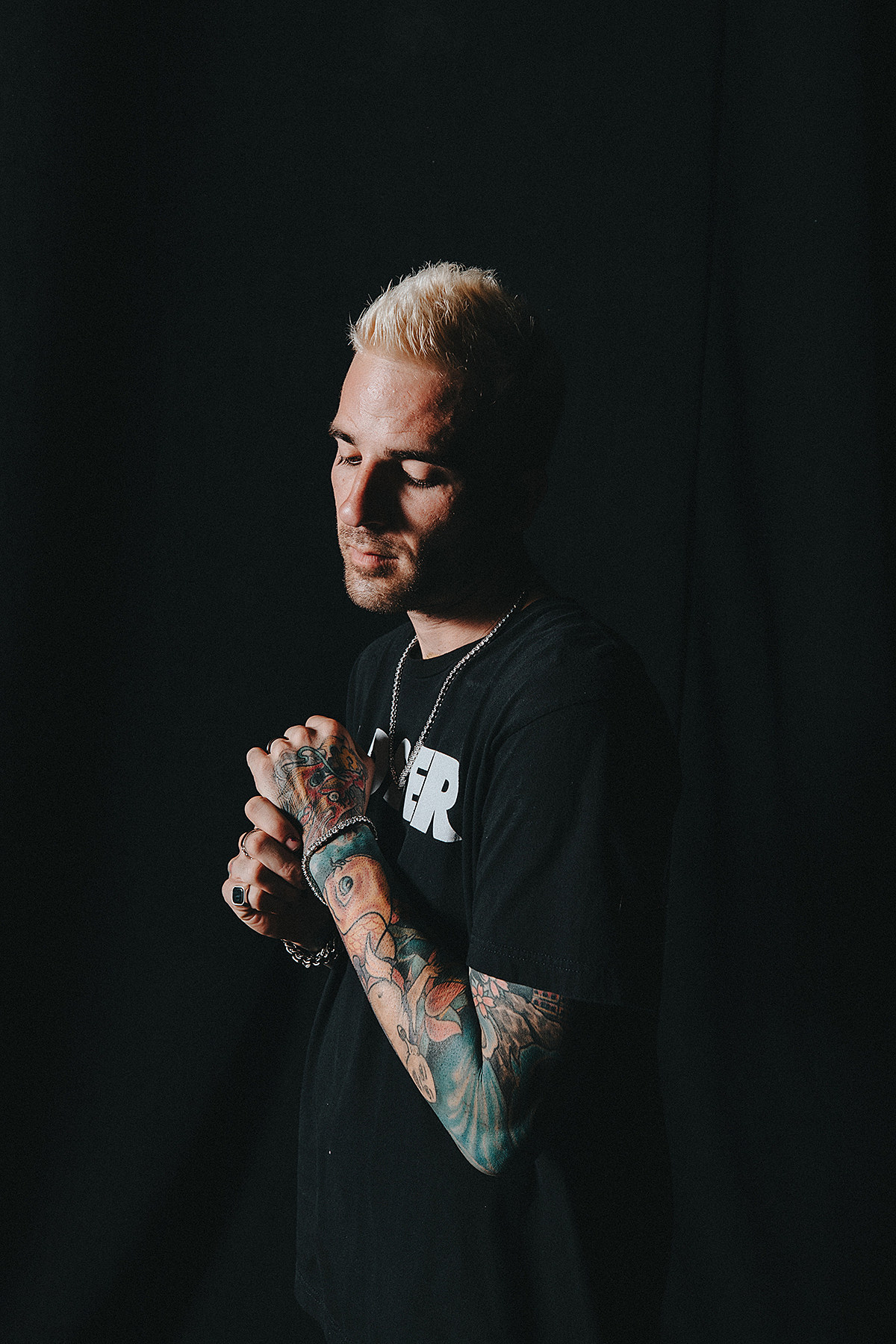 [Photo by Jordan Kelsey Knight]
[Photo by Jordan Kelsey Knight]
The first singles from the album, “Parasite” and “Kill Beautiful Things,” are great introductions to your new era, leaning toward the punchy and melodic sound that will definitely draw a huge energy from crowds at live shows. How does this sound compare to what we’ll hear on the rest of the album?
“Kill Beautiful Things” is probably the most melodic and the lightest song on the album, but it feels like a really strong song. The chorus is big. Our new guitar player Alex Adamcik sent me the riff, and it felt like Deftones and Thirty Seconds To Mars, and I was way into it. We like all kinds of music here. Our first album really homed in on our nü-metal influences because we were just having fun. This time around, those influences are still there. The two songs from the Mannequin Eyes EP are going to be on the album as well, and the track “Parasite” fully showcases a lot of different vibes, from Static-X to Lamb Of God, in my opinion.
School Of Thought is still DED, but it’s broadened out with more influences included in it, so I think it’s a lot more dynamic. It made us happy when we made it, and it makes me happy when I listen to it now, which is what the first album did. So we’re just going with it, making music that makes us happy, and hopefully, it makes other people feel good, inspired or affected.
As a songwriter, I just like a good song. I don’t care if it’s seven minutes long or one minute long, as long as it resonates with me. We’re all humans, so we’re all made up of the same kind of thing, and we all feel things in similar ways. So if those beats, grooves, melodies, lyrics [or] frequencies feel good in my body, then hopefully it’ll feel good in someone else’s body in some way. I might be having a crummy day, and then I could put on some Pantera and feel like I’m a million miles tall or put on some Paul Simon and I feel happy.
The cover art for Mis•an•thrope gave us so many old-school Korn and Slipknot vibes, throwing back to the golden age of nü metal. What can we expect from the album artwork for School Of Thought?
This time around, we went through a lot of ideas but landed on an old classic black album cover with our new logo that I’m in love with. We wanted that new logo to be something that stands the test of time because we’re always changing with different eras, and we needed something different from the first one. When it was done, I thought of Metallica, AC/DC or KISS, something really classic. I really hope this new logo feels correct for us in a couple of years from now, but right now, it feels like a timeless cover, and I hope that’s the case in the future because you never know something’s going to be timeless until it actually is.
How do you want people to feel when they hear School Of Thought in its entirety for the first time, whether they’re established fans of DED or new acquaintances getting to know you and your approach?
I don’t want anybody to do anything, really. I just hope that they listen to it and enjoy it, but if they don’t, that’s totally OK. A lot of my favorite bands are polarizing bands you either love or hate. I think that’s always been something for me with the music I make. I’m OK if people love it or hate it. There’ll be people in the middle, too, which is fine, but I hope it affects people. I think that’s what good art does—a good film, a painting. As long as it affects you, whether it’s negatively, positively, it makes you happy, or it makes you sad, then it’s good because its purpose is to be shared and to affect. That’s all I want.
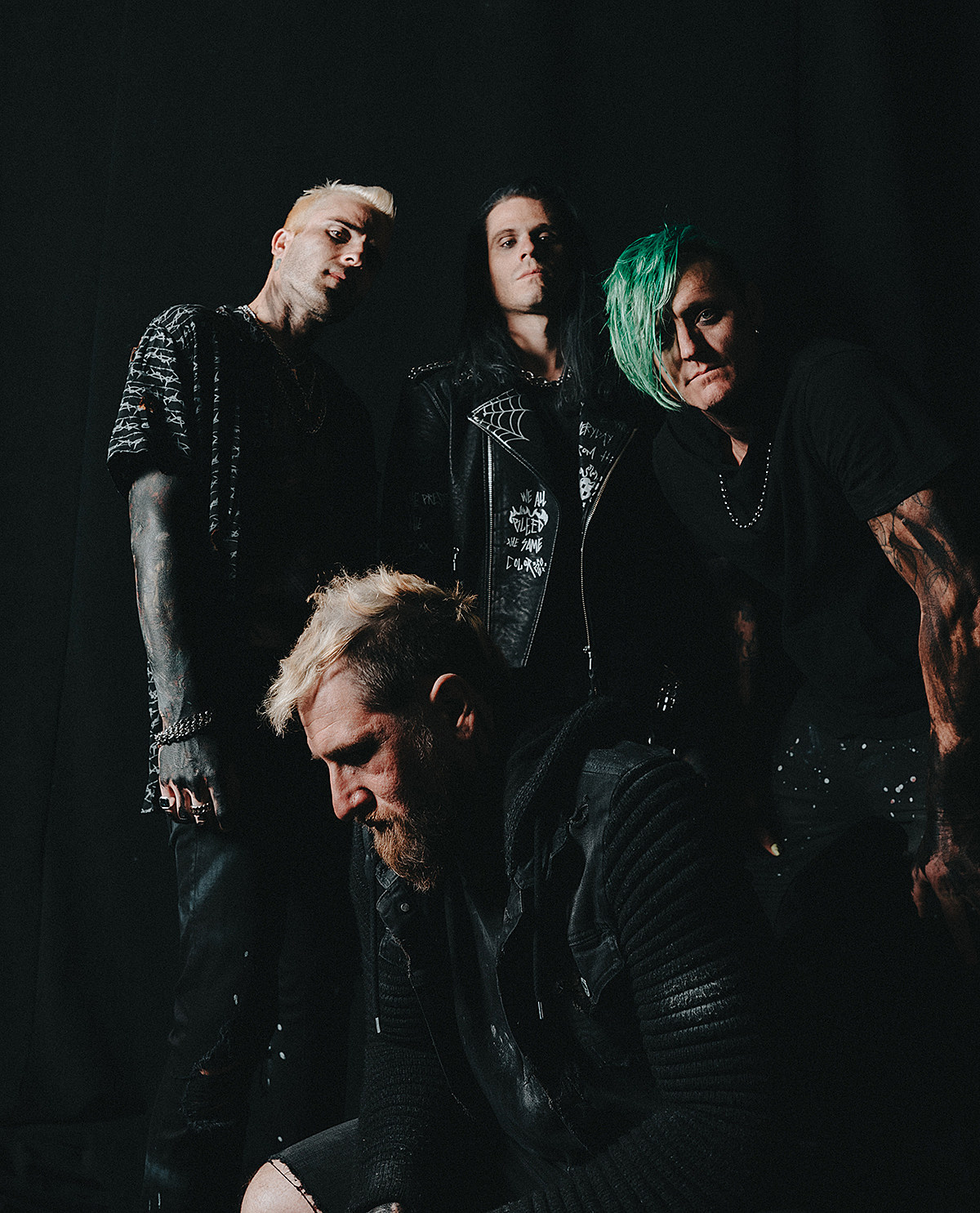 [Photo by Jordan Kelsey Knight]
[Photo by Jordan Kelsey Knight]
DED songs have always carried more weight than your average metal hit—there’s a deeper meaning and moral message throughout that gives your music an added impact, whether you’re listening to an album from front to back or dipping into individual songs. Which track from School Of Thought means the most to you personally?
“Kill Beautiful Things” is one of the tracks that’s really close to me. Truthfully, it’s like a story of me growing up and not understanding war, racism or classism, or separation of religion; basically not understanding why humans were being what they were being. Especially being a kid, you’re there like, “Why don’t we all just skateboard and play basketball?” When you become an adult, you get affected by it. At least I did. I got bitter and negative sometimes, which led to me doing things that I wasn’t ultimately proud of. You have survival instilled in your DNA. It’s just something that you do—if someone hits you, you wanna hit them back.
Really, this song is to remind myself of my purpose, my morals, my ethics and what’s important to me and to always stay in that through fire, strife, turmoil and everything. “I kill all of the beautiful things to keep me alive in a world so cold”—hopefully, that line makes sense because the world, nature, the universe is all so beautiful, and life in its true essence is love and experience and beauty, electricity and energy. You’re out there in the world, and you’re doing things you shouldn’t do because you feel like you need to survive. However, I think you can always maintain a level of consciousness and integrity through everything you do. That’s me thinking as a work in progress because we’re all just works in progress. We’re all trying to be better than we were the day before, or at least that’s what I’m trying to do.
The last year-and-a-half has given us all plenty of time to think about our existence and reflect on our actions in that same way. How have you handled all this time without shows? Have you made any changes in your life?
I’m dating Maria Brink from In This Moment. She’s my love, and she lives up in New York, so I moved up there in the woods, and we’re having a great time. It’s cool because I’m from Phoenix, so I don’t have a lot of that down there. My dad is from Long Island, so I spent a lot of time up there growing up, but it’s been really nice up there. That’s where we filmed the “Kill Beautiful Things” video, too. We couldn’t really go anywhere to a studio in L.A. at the time, so we went out, and there were woods everywhere. We thought, “Let’s just do it in the woods.” It’s been really beautiful. There are all kinds of animals, and there’s snow up there. You see the seasons a lot more. It’s really cool and different for me. I’m just with Maria, so I’m happy with her. That’s all I need.
Have you picked up any quarantine hobbies?
We started cooking a lot and watching a lot of MasterChef. We’ve had such a great time doing that. Maria’s a better cook than I am, but I do my best. We’ve been doing some sports, going hiking and stuff like that. It’s been amazing, especially in New York because there’s waterfalls and really cool places to hike. We play a lot of music, of course. She has her piano, and I have my guitars, so sometimes we just hang out and play music.
We’ve been spending a lot of good quality time together, especially because we’re always touring, being home together with our dogs and really enjoying each other. A gift can be a curse, and a curse can be a gift. A lot of the time, there are beautiful things inside of something negative, so having that time to spend together was a really amazing gift in a way. I also had time to step back. I do a lot of breath meditation, which John Feldmann taught me about and led me to Jon Paul Crimi. [Breath meditation is] something I stopped doing, but I restarted now. It brings a lot of gratitude into your heart.
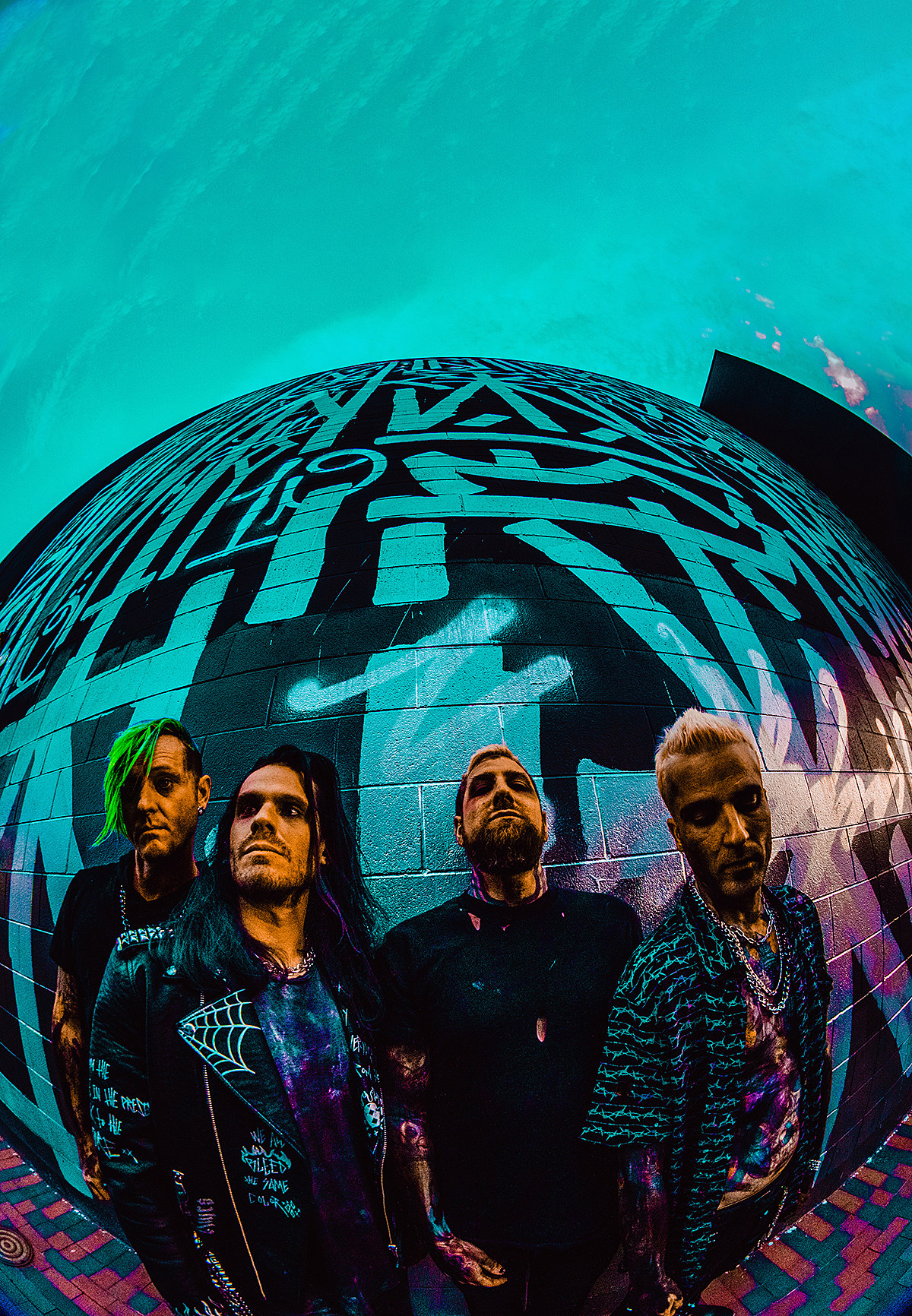 [Photo by Justin Hudson]
[Photo by Justin Hudson]
You’re back on the road across the U.S. with Black Veil Brides and In This Moment. That’s an insane tour package. How are you all getting along so far?
It’s been amazing. I met Andy Biersack a couple of times before. Andy was Matt Good’s best man at his wedding, so we met him there. BVB were also around Feldmann’s studio, as they were recording at the same time as us, so we’d run into each other and met a few times. They’re such a great band live. They have such great songs and melodies, and I love watching them. Of course, it’s amazing to watch ITM every night. It’s so good that me and Maria can tour together. I did a song on their album [Mother] called “Hunting Grounds,” and it was an honor. This tour feels like a breeze. It feels like all the fans are loving all three bands, and it feels like a strong tour package. There’s a lot of respect and good times going on.
How much has touring changed in a post-COVID-19 environment?
It feels pretty normal to me other than you’ve got to wear your mask, and you’ve got to be careful. We’re doing our best to stay away from people, which sucks when you’re walking down the street and you see somebody that wants to talk. You just wanna embrace everybody. That’s instilled in me naturally, but you have to tell people, “I can talk to you for a minute, but you’ve gotta stay way over there,” or “You can take [a] photo, but you’ve gotta stand over there, and I’ll stand behind you.”
That’s heartbreaking, especially when it’s somebody with a little kid, but it’s nothing political. We’re just trying to keep everybody healthy so we can keep playing shows and touring. That’s all it comes down to. The crowd reaction seems so huge from everybody there so far. Everybody’s thirsty for shows, so I ask the crowd every night if this is their first show back, which it is for more than half the crowd. We haven’t played shows in forever, so we’re excited, too.
Has this time apart brought you and the rest of the band closer together?
I think it has, in a way. It’s brought me closer to the people that are really important in my life, like my parents. It gave us perspective. I had a lot of people pass away over the last year-and-a-half. It’s helped me appreciate the guys a lot more. Our new guitar player Alex is awesome, and he breathes so much excitement and life into the band. He’s just a really creative guy. Matt Reinhard [drums] and I have been making music together for 15 years now. Kyle [Koelsch, bass] is just amazing, and so is our whole crew.
It’s really exciting to be back and to have “Kill Beautiful Things” be received so well and to finally release this album. We’ve been getting pounded by our fans like, “Where the hell is your new album?” We get it. It was long overdue before the pandemic, and now it’s really overdue. We wrote a lot over the pandemic as well. We’ve been sending demos back and forth, trying to stockpile songs so we’re ready to do another album and not wait nearly as long next time.
It’s my life and the guys’ as well, our lives and our legacy together, so we want to be proud of it, and we wanted to be honest [about] where we are right now. I had some friends send me some old demos from old bands I was in, and it’s like looking through a yearbook, seeing your albums and hearing your songs you haven’t heard in a long time. It’s something you look back on, and it reminds you of where you were and where you’ve gone since then.
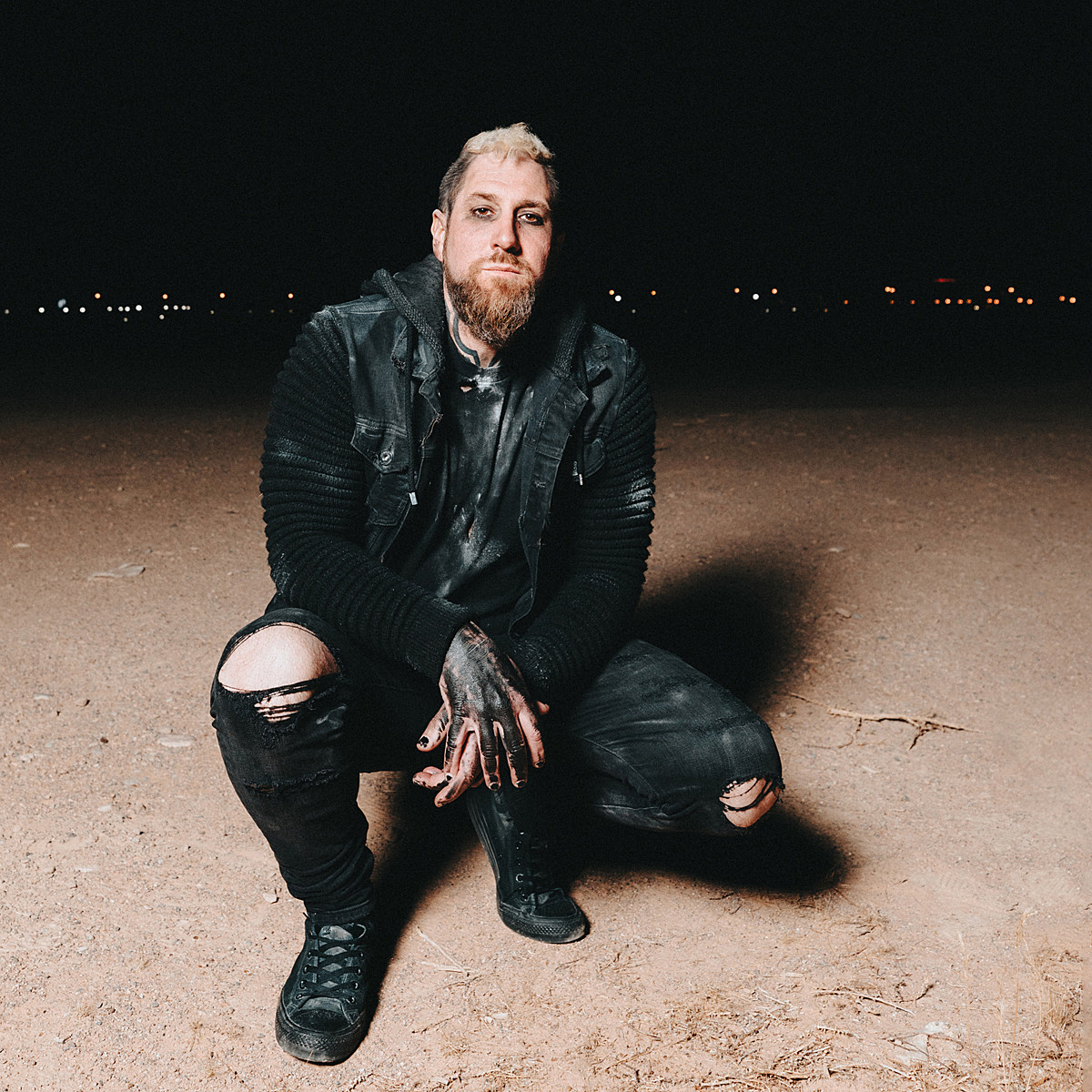 [Photo by Jordan Kelsey Knight]
[Photo by Jordan Kelsey Knight]
Besides the album release and the rest of your U.S. tour, what’s next for DED?
If everything with the COVID stuff continues to go where it’s going, then we can continue touring, so we’ll be touring a lot and supporting the album, making music videos. We’re doing Danny Wimmer’s Voragos cruise to Belize with Mastodon, Rob Zombie, and so many other awesome bands. We’ll be doing a lot of touring because that’s just what we want to do. We wanna play shows for people who wanna get close to people again. I think where DED is best is live with people singing back and forth. It’s very inclusive, and a lot of that comes from loving that experience when I was at shows growing up. I was always in the front, diving and doing everything. Now it’s my turn to do that for other people.
What’s been your proudest moment with DED so far?
There are so many. Having worked with the people I’ve worked with—Jordan Schur, Benji, Joel and Josh Madden, John Feldmann, Kevin Churko, the artists we’ve collaborated with—that’s all really huge to me to be making art with people at such a high level. It’s opened so many doors for me: We met [producer] Zakk Cervini with John Feldmann on the first album, and I’ve gone on to write with him for Beartooth, Being As An Ocean, and Afterlife. He’s gone on to do amazing things, and I’m so proud of him—good people do good things, and we all support each other. Playing Download Festival in the U.K. was pretty amazing to me. That was something I never thought I’d do in my life. I can’t pinpoint it down to one thing because I’m so proud of it all, but finding the love of my life through music is a pretty beautiful thing.
DED appeared on the cover of issue #399, available here.










